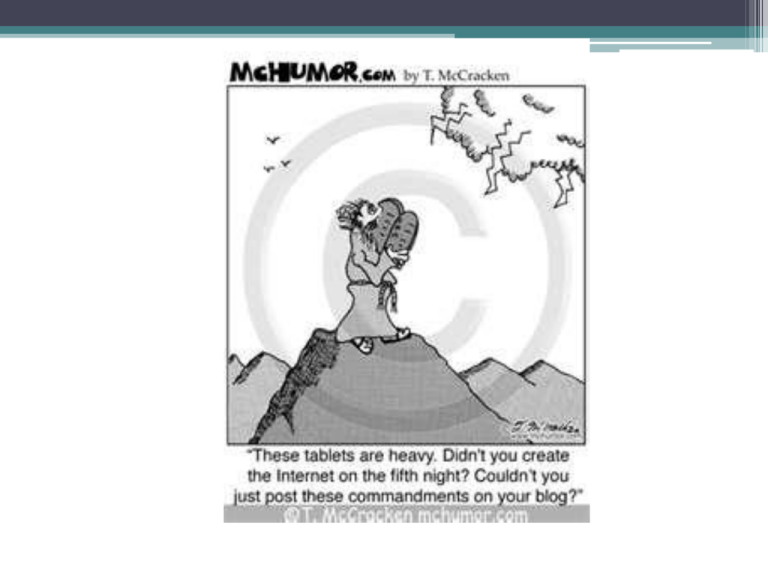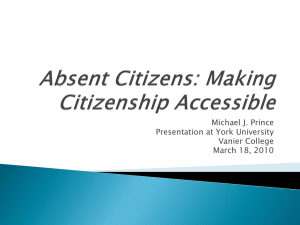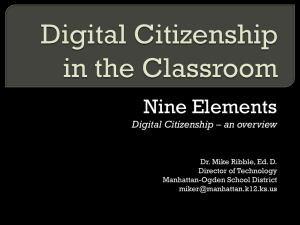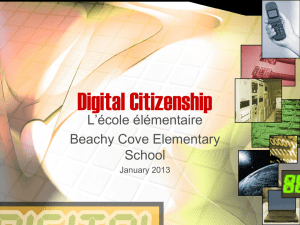Integrating Digital Citizenship in a Web 2.0 World
advertisement

Liberation in a Digital Age Dr. Mike Ribble, Ed. D. Author of Digital Citizenship in Schools and Raising a Digital Child http://www.digitalcitizenship.org How Did We Get Started with Technology Issues??? What are we left with…. Marshall McLuhan – The Medium is the Message Technology as Extensions of the Human Body: …various ways human beings extend themselves, and how these extensions affect our relationships with one another. An extension occurs when an individual or society makes or uses something in a way that extends the range of the human body and mind in a fashion that is new. Every extension of mankind, especially technological extensions, have the effect of amputating or modifying some other extension. The telephone extends the voice, but also amputates the art of penmanship gained through regular correspondence. http://www.leaderu.com/orgs/probe/docs/mcluhan.html “Frankenstein Syndrome – One creates a machine for a particular and limited purpose. But once the machine is built, we discover – sometimes to our horror, … that it has ideas of its own.” According to Postman technology created childhood (the creation of the printing press) and technology is taking away childhood through the sharing of information with everyone and the lack of secrets to our children. His example was television about this eroding between childhood and adulthood but the same could be said about any digital technology today: First, it requires no instruction to understand its form Second, it does not make complex demands on either mind or behavior Third, it does not segregate its audience This is what Digital Citizenship is all about..!!! http://www.lolomgbook.com/ 1st Question – “Why are you online?, What is the reason to have a Twitter or Facebook account?” 2nd Question – “Is now the right time?” 3rd Question – “Where is your line between public and private?” Why are actions like cyberbullying happening even after grade 12? 1.) Abstraction – it doesn’t feel “real” 2.) Invisible Impact – not aware of visual cues 3.) Shaming – very little recourse in the virtual world 4.) Anonymity – do not need to come face-to-face with other person 5.) It’s the Norm – “Everyone’s doing it” How Did I Get Involved in Digital Citizenship? 2010 Report to the Commerce Department – Anne Collier (co-chair) Several Recommendations by Subcommittees – From the Internet Safety Education two recommendations were: promote instruction in digital media literacy and computer security pre-K12 and promote digital citizenship in pre-K-12 education as a national priority. http://www.athinline.org/ http://www.intgovforum.org/cms/ From Anne Collier’s Notes from the Sixth Annual IGF Meeting was held in Nairobi, Kenya on 27-30 September 2011 at the United Nations Office at Nairobi (UNON). “Asked how they’d rank ‘digital citizenship’ on a scale of 1 to 10 – with 10 representing ‘very relevant and meaningful’ – a youth panel from Egypt, the US, and UK ranging in age from 15 to 22 gave it a 1, two 3’s, a 5, a 6, and an 8.” “The British teen who gave it a 1 said it ‘sounds distant and abstract,’ and people shouldn’t distinguish between citizenship and digital citizenship anyway. Another UK teen said, ‘Maybe ‘participant’ is a better word than ‘citizen’.’ An American university graduate newly living in Nairobi gave it a 6 saying she hopes it’ll catch on but ‘it’s not relevant to our generation yet.’ My Observations… •Technology has become too easy, too quick, too accessible. •When things are this quick, easy and accessible then you are headed for problems. •Very little training has been provided •Now is the time to stop and think Australia Moving Toward D.C. Government proposes new digital contract to rein in offensive online behaviour by: Lanai Vasek From: The Australian September 15, 2011 3:19PM • THE Gillard government will seek to rein in offensive online behaviour, proposing a new "digital social contract" to underpin Australians' lives as cyber citizens. What is a good digital citizen? BY CYBERWHITEPAPER ON SEPTEMBER 20, 2011 The questions for Australians are: What does it mean to be a good digital citizen? What are the norms of behaviour that we should be seeking to encourage among our fellow digital citizens? What role do governments, the private sector, community sector and individuals have in promoting ‘good digital citizenship? What is Digital Citizenship or why is it important to me? Michelle’s Story… Dr. Jason Ohler http://www.jasonohler.com/index.cfm “what it means to be a citizen in the Digital Age” Cable in the Classroom Digital Citizenship is a holistic and positive approach to helping children learn how to be safe and secure, as well as smart and effective participants in a digital world. That means helping them understand their rights and responsibilities, recognize the benefits and risks, and realize the personal and ethical implications of their actions. Stephen Balkam – Family Online Safety Institute http://www.youtube.com/watch?v=i8c9EAqNFC4 Current ISTE NETS-S Dealing with Appropriate Use (updated Summer 2007) 5. Digital Citizenship Students understand human, cultural, and societal issues related to technology and practice legal and ethical behavior. Students: • advocate and practice safe, legal, and responsible use of information and technology. • exhibit a positive attitude toward using technology that supports collaboration, learning, and productivity. • demonstrate personal responsibility for lifelong learning. • exhibit leadership for digital citizenship. Changes to NETS·T (updated Summer 2008) 4. Promote and Model Digital Citizenship and Responsibility Teachers understand local and global societal issues and responsibilities in an evolving digital culture and exhibit legal and ethical behavior in their professional practices. Teachers: a. advocate, model, and teach safe, legal, and ethical use of digital information and technology, including respect for copyright, intellectual property, and the appropriate documentation of sources b. address the diverse needs of all learners by using learner-centered strategies and providing equitable access to appropriate digital tools and resources c. promote and model digital etiquette and responsible social interactions related to the use of technology and information d. develop and model cultural understanding and global awareness by engaging with colleagues and students of other cultures using digital-age communication and collaboration tools Changes to NETS-A (updated Summer 2009) 5. Digital Citizenship. Educational Administrators model and facilitate understanding of social, ethical, and legal issues and responsibilities related to an evolving digital culture. Educational Administrators: a. ensure equitable access to appropriate digital tools and resources to meet the needs of all learners b. promote, model, and establish policies for safe, legal, and ethical use of digital information and technology c. promote and model responsible social interactions related to the use of technology and information d. model and facilitate the development of a shared cultural understanding and involvement in global issues through the use of contemporary communication and collaboration tools My Definition: The norms of appropriate, responsible behavior with regard to technology use. How Do We Organize This Information for Teachers, Students and Parents? Nine Elements of Digital Citizenship Etiquette Communication Rights and Responsibility Access Literacy Safety (Security) Law Commerce Health and Welfare These Elements will be the Focus and Foundation for our discussion. What we will be doing… For the next few minutes break into your school groups and discuss what are the issues or potential issues you might find in your schools related to technology. Thank you again for your attendance and participation.






